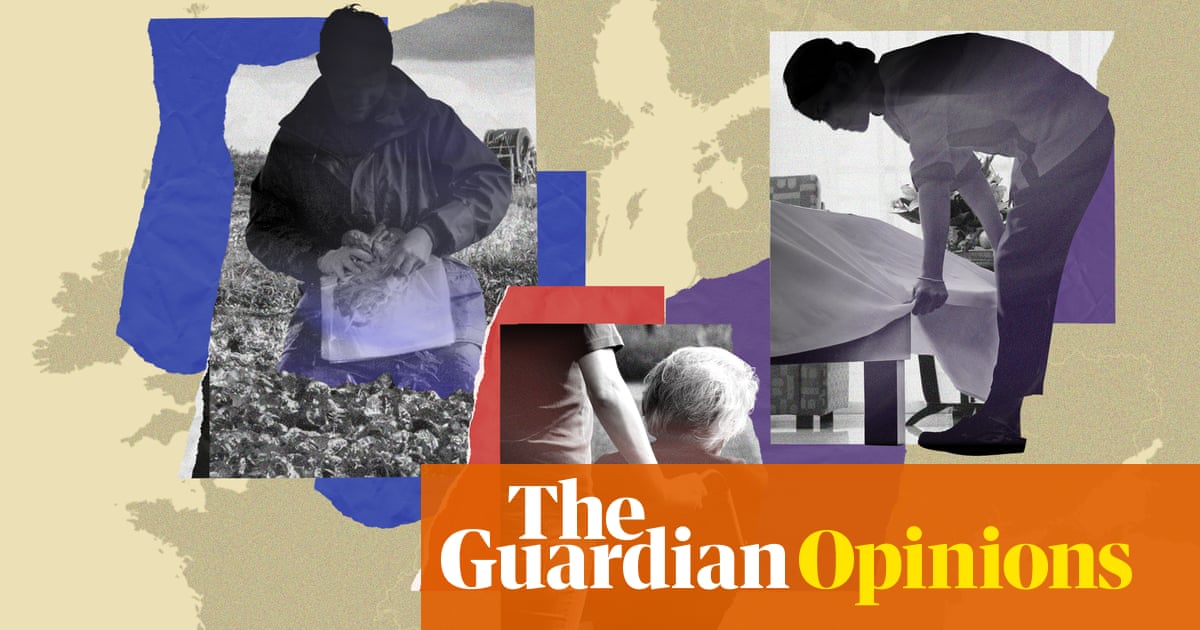Jobs
Who keeps Europe’s wealthy west going? Underpaid, invisible migrants from its east – and I went undercover to find them | Saša Uhlová

Migration statistics don’t tell us much about the people who leave their own countries and loved ones to work in poorly paid and physically demanding jobs. A lot of the time, we don’t even see them – because they live somewhere out of sight in hostels and spend their days working.
I worked undercover alongside some of them for a number of months in 2022, to report on the shocking conditions facing EU citizens who work in the lowest-paid jobs in western Europe – often invisibly.
Five years earlier, in 2017, I had gone undercover in my own country, the Czech Republic, to experience work in some of the worst-paid sectors there. I did jobs in a hospital washroom, at a poultry plant, behind a cash register and at a waste-sorting facility. That project became a book and a film.
In 2017 I had noticed that most of my co-workers from poorer countries, such as Ukraine or Romania, who had found work through job agencies, worked much longer hours than Czech staff and endured conditions worse than anything that local people would tolerate. I decided to expand the project to assess conditions for eastern European workers in some of the lowest-paid sectors in western Europe.
The EU forms a single labour market that makes migration for work very easy, but inequalities between the 27 nations create a range of problems. Migration flows within the EU increased dramatically after central and eastern countries joined the bloc between 2004 and 2007, gaining rights under the EU’s free movement policy, and after the financial crisis of 2008. The real driver of east-west migration, however, is that big differences in wages, living standards and incomes persist. You could say that Europe remains divided, not by an iron curtain but a wage curtain.
As a Czech woman, it was not hard to find low-skilled jobs: on a German fruit and vegetable farm, as a hotel cleaner in Ireland and in France’s social care sector. I spent a couple of weeks looking for work in the UK, but Brexit has made it difficult for EU citizens without a permit to work legally.
The jobs I did were very different, but all had one thing in common: if local people had been employed in them, they would struggle to make ends meet, and employers’ demands on their time would prevent them from leading anything resembling a normal family life.
A willingness to work long hours for relatively little money appears to be propping up whole sectors that depend on the cheap labour of migrants in various countries.
Theoretically, in German agriculture you cannot work more than eight hours a day, five days a week. However, the German labour code allows for seasonal workers to do 10 hours a day. Even this flexibility in the code is frequently taken advantage of, with migrants asked to work in excess of what the law allows. Those extra hours are not, of course, officially recorded.
None of this, however, explains the psychology of a worker who has the same employment and citizenship rights as every other worker with an EU passport, remaining in a job where they are ripped off, sleep deprived and often denied the legally mandated time off.
As I discovered from talking to my co-workers, the essential paradox – and the big advantage for employers in the sectors most dependent on migrant workers – is that the last thing people who leave their families to work abroad want is to work fewer hours. If they are paid by the hour, they want to work most of the time they spend abroad. They want to make up for the feeling of having abandoned their children or parents by making as much money as possible and limiting the time available for self-destructive thinking. And also by drinking alcohol.
So they clock up the hours, but the body hits its limits, especially when the working conditions are inhumane. I found out the toll it takes when you work manually 14 hours a day for six or seven days a week. The sheer number of hours worked leaves too few hours to sleep.
Employers who pay minimum wage or even less tend to have trouble keeping staff. But for every migrant worker who leaves, there is a crowd of others willing to come, until they too reach the point of exhaustion. As they are easily replaceable, there is little incentive to improve the working conditions or even create a welcoming environment.
Yet my Polish co-workers voluntarily came back to a place they regarded as hell, returning to the German farm where they worked seven days a week, often for 14 or more hours a day.
I now consider the separation of families to be among the worst aspects of worker migration. Many, if not most, of the women I met doing extremely gruelling jobs for little pay had come without partners or children. Usually the process of family disintegration had started earlier, when their partner had left, say, Poland, to earn money in Germany or another western country.
after newsletter promotion
The long separation often resulted in the man leaving his family. The women then found themselves left as single mothers and unable to support their children. So they entrusted them to relatives, most often mothers or sisters, and went to earn money abroad. First the nuclear family broke up, then the rest of it as well.
Many of these women learned to deal with the pressure of the job and the sadness of separation from children and family by turning to alcohol. And so they themselves gradually disintegrated. Hard physical work and an associated unhealthy lifestyle have an impact on health over time. One irony is that migrant workers often return home for medical treatment, their illnesses covered by the public health systems back in Poland or Slovakia.
Many of my co-workers had dreams of buying a house or an apartment in their home country, providing for their old age, helping their children. But some of them ended up staying away permanently because the work destroys their lives at home. The days they are not working, they drink away.
My diaries and the footage I shot using a hidden camera will introduce you to some of those I met, including Sabina and Ewelina, a Polish mother and daughter, on their feet for 14 hours a day on the German farm to send money home to keep family members afloat. Danka, in her 60s, who loved showing me photos of her children and grandchildren – all of them back in Poland. And a Slovakian couple, Sára and Sebastian, with high-school diplomas and a good command of English, who put up with terrible working conditions in an Irish hotel.
The hotel’s management relied on an agency supply of cheap labour from eastern Europe. The fact that the hotel was in a remote location, and the punishingly long hours spent at work, made it nearly impossible for staff to actively look for better jobs.
On the farm and in the hotel, I found that much of the pressure to perform was internalised. I noticed that if I was doing something slowly, I would be scolded, not by a boss, but by a colleague.
I was fascinated by how many people wanted to be good at their jobs, even if they got few benefits from it. Under communism we had the Order of the Hero of Socialist Labour, awarded to citizens who performed to exceptional standards in industry. The conduct of today’s EU migrant workers reminded me of those days.
-
Saša Uhlová is a staff writer at the Czech online daily Deník Alarm. Her reporting was supported by the The Endowment Fund for Independent Journalism. The accompanying documentary film, Limits of Europe, was directed by Apolena Rychlíková. Names have been changed.
-
Do you have an opinion on the issues raised in this article? If you would like to submit a response of up to 300 words by email to be considered for publication in our letters section, please click here.










